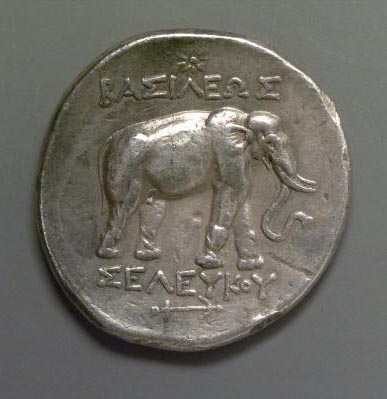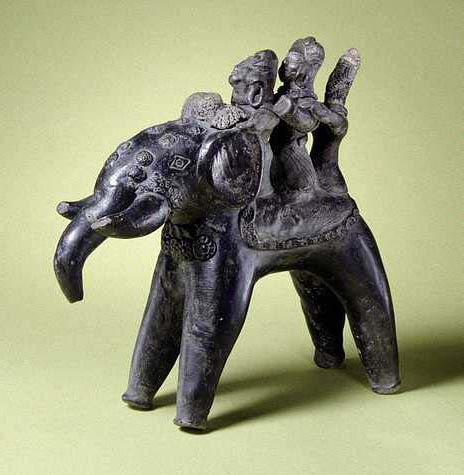The Government
of Mauryan Empire
 In
any civilization, it is vital that there is an organized, and able government.
Because the government basically controls the life of a people, if the
government is in shambles, so is the civilization. Stable government is
very important for the upkeep of a civilization internally. For instance,
if the government does not enforce its laws, there is no reason for the
people of that civilization to infringe them. Obviously, if the people
of a nation are breaking the rules, that nation can not stand. The Government
is also important in foreign affairs. If a military is not well funded,
it becomes weak. If a military becomes weak, it is conquered. Obviously
the structure of the government itself must be stable if the government
is to remain sound. It is also important that there be good communication
between the people and the government. If the communication is bad, obviously
it will take longer for plans and laws to be carried out. It is vital too
that the people have a sense of allegience to the ruler and government, so
that there is less rebellion and civil strife. Finally, it is important that
power is exchanged through a family line. That way, there is a less chance
of a power struggle between rulers. All these aspects are central to the well-being
of a government and thus a civilization.
In
any civilization, it is vital that there is an organized, and able government.
Because the government basically controls the life of a people, if the
government is in shambles, so is the civilization. Stable government is
very important for the upkeep of a civilization internally. For instance,
if the government does not enforce its laws, there is no reason for the
people of that civilization to infringe them. Obviously, if the people
of a nation are breaking the rules, that nation can not stand. The Government
is also important in foreign affairs. If a military is not well funded,
it becomes weak. If a military becomes weak, it is conquered. Obviously
the structure of the government itself must be stable if the government
is to remain sound. It is also important that there be good communication
between the people and the government. If the communication is bad, obviously
it will take longer for plans and laws to be carried out. It is vital too
that the people have a sense of allegience to the ruler and government, so
that there is less rebellion and civil strife. Finally, it is important that
power is exchanged through a family line. That way, there is a less chance
of a power struggle between rulers. All these aspects are central to the well-being
of a government and thus a civilization.
The Mauryan
Empire really had no choice but to have an efficient and well run government
to even survive. The structure and communication of the Mauryan Empire was such
that it allowed it to be one of the greatest of all time. The structure
of the government itself contained many layers. It became such that almost
every person with a skilled job was under the direction of someone else,
whom they had to report to and were controlled by. Officers were paid well,
because the Mauryans believed that high salaries would make the government
more efficient. Above all layers was the ruler, given immense power. He
had a council of ministers for advice on matters. He wielded complete military
and civil authority. Despite having such great power, Mauryan rulers tried
to establish a father-son relationship between them and their subjects. They
reputedly always wanted to know what was on the minds of their people, always
willing to hear complaints or obtainable for consultation. Asoka declared
he was accessable at all times for his council of ministers. To further
increase communication, a great system of roads throughout the empire. Most
notable of this system was the Royal Highway, which ran from Taxila
over 1000 miles to Paliputra. To also increase communication directly with
its people, the ruler had a number of spies and agents to monitor how superintendants
ruled and to find the general consensus of the masses. We see here a general
concern for the well-being of the citizens of the Mauryan Empire. It also
shows an emphasis on the merit of the officials, for if an official was
not treating his people fairly, or was not doing his job properly he would
be ejected. In order to afford such a large army and to pay the officials,
a tax system was necessary. The Mauryan Empire is said to have had taxes
on about anything possible from cutting down trees to prostitution. It is
also important to note that power was passed through the family line. Thus,
transition between rulers was relatively smooth, although after Bindusura,
there was a bit of a power struggle between family. (Thepar) The Mauryans
were able to maintain such a large empire partly due to its amazing efficient,
able and organized government.
The structure and communication of the Mauryan Empire was such
that it allowed it to be one of the greatest of all time. The structure
of the government itself contained many layers. It became such that almost
every person with a skilled job was under the direction of someone else,
whom they had to report to and were controlled by. Officers were paid well,
because the Mauryans believed that high salaries would make the government
more efficient. Above all layers was the ruler, given immense power. He
had a council of ministers for advice on matters. He wielded complete military
and civil authority. Despite having such great power, Mauryan rulers tried
to establish a father-son relationship between them and their subjects. They
reputedly always wanted to know what was on the minds of their people, always
willing to hear complaints or obtainable for consultation. Asoka declared
he was accessable at all times for his council of ministers. To further
increase communication, a great system of roads throughout the empire. Most
notable of this system was the Royal Highway, which ran from Taxila
over 1000 miles to Paliputra. To also increase communication directly with
its people, the ruler had a number of spies and agents to monitor how superintendants
ruled and to find the general consensus of the masses. We see here a general
concern for the well-being of the citizens of the Mauryan Empire. It also
shows an emphasis on the merit of the officials, for if an official was
not treating his people fairly, or was not doing his job properly he would
be ejected. In order to afford such a large army and to pay the officials,
a tax system was necessary. The Mauryan Empire is said to have had taxes
on about anything possible from cutting down trees to prostitution. It is
also important to note that power was passed through the family line. Thus,
transition between rulers was relatively smooth, although after Bindusura,
there was a bit of a power struggle between family. (Thepar) The Mauryans
were able to maintain such a large empire partly due to its amazing efficient,
able and organized government.
